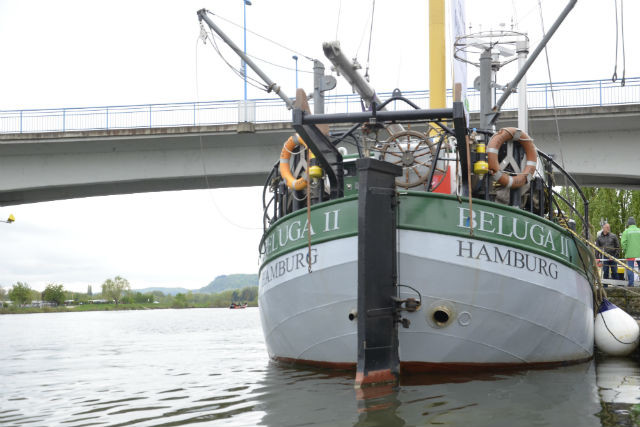Greenpeace exhibited a 2.5-metre tall monster made from repurposed plastic items on the quay next to their Beluga II boat, which they sailed to the Moselle town for the second time.
The world depends on plastic but with only around 10% of all plastics being recycled, it is rapidly becoming an environmental and human catastrophe. According to the European Commission, over 80% of marine litter is plastics, which find their way into marine species, including turtles, seals, whales, birds, fish, shellfish, and ultimately, the human food chain.
But it’s not only the oceans which are impacted.
In 2016, Greenpeace researchers aboard the Beluga II travelled along the Rhine, Main, Danube, Elbe, Weser, some canals and the Wadden Sea collecting water samples. Laboratory analyses showed that all samples contained plastic particles ranging from 0.3-5mm, suggesting that the pollution of oceans is starting in rivers.
The majority of the samples concerned plastic packaging polyethylene (PE) and polypropylene (PP). They also found styrofoam (PS-E), polyamide/nylon (PA), polyester (PEsT, including PET), styrene acrylonitrile copolymer (SAN) and acrylonitrile butadiene styrene (ABS), which is used for electronic housings or toys. Plastic particles were mainly fragments produced from decomposition or wear or larger plastic parts.

Greenpeace activists are pictured filtering waste from the river. Photo: Greenpeace Luxembourg/archives
Single-use plastics ban
On 27 March, the European Parliament approved a new law banning single-use plastic items including plates, cutlery, straws and cotton buds, balloon stick and oxo-degradable plastics and food containers. At the same time, it set a 90% collection target for plastic bottles by 2029 and plastic bottles will have to contain at least 25% of recycled content by 2025 and 30% by 2030, under the law. The agreement also strengthens the principle of the polluter pays, extending the responsibility for producers of things like tobacco products with plastic filters and fishing gear.
Greenpeace Luxembourg director Raymond Aendekerk pointed out over the weekend that not all plastics can be recycled. “Residents wonder why they have to solve this plastic crisis, and not the companies which caused it. Polluters should take responsibility and do all they can to reduce waste,” he said.
He said he believes the amount of plastic waste being generated will only grow in future if no action is taken. Greenpeace called on companies to make their plastic footprints more transparent and to put in place goals and measures to reduce their disposable packaging.
